PRINCETON, NJ -- As the first actual voting in the 2008 presidential race draws near, it is a good time to review the patterns of support for the Republican presidential candidates among various subgroups of the national Republican population.
The analyses that follow are from two Gallup Polls conducted in late November/early December and in mid-December, providing an aggregated sample of more than 800 Republican voters.
Several of the candidates, the analysis shows, have fairly distinctive patterns of support. Former New York City Mayor Rudy Giuliani does best among moderate/liberal Republicans, those who seldom or never attend church, and younger Republicans (despite the fact that he is 63). Arizona Sen. John McCain has a more even distribution of support, although he does at least slightly better among moderate/liberal Republicans. Former Arkansas Gov. Mike Huckabee does much better among conservative Republicans, high-frequency church attenders, those who are older, and those in the South and Midwest. Former Massachusetts Gov. Mitt Romney's appeal is higher among conservative Republicans, and is slightly higher among older Republicans and those with college degrees. Former Tennessee Sen. Fred Thompson's appeal is higher among conservatives and in the South.
Ideology
There are significant differences in candidate preference by the self-reported ideology of Republicans. Four candidates -- Huckabee, Giuliani, Thompson, and Romney -- essentially tie among conservative Republicans. Giuliani leads among moderate/liberal Republicans, followed by McCain.
Coming at this from a different perspective, it appears that the appeal of Giuliani and McCain skews toward moderate and liberal Republicans, while the appeal of Huckabee, Thompson, and Romney skews toward conservative Republicans.
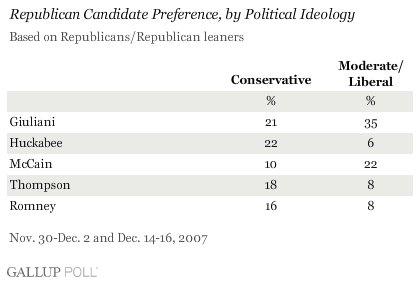
Hard-core Republicans -- those who immediately identify with the GOP as opposed to independents who lean toward the GOP -- are stronger in their support for Thompson than are independents who lean Republican. There is relatively little difference across the other candidates, however.
Religion
Religion is a variable that provides important differentiation within the Republican Party in today's political environment. Republicans who are very religious -- in this analysis operationalized by self-reported church attendance -- can have significantly different voting patterns than do Republicans who are less religious.
The accompanying table displays candidate support by church attendance. The biggest differences come in terms of support for Giuliani and Huckabee. The former -- a Roman Catholic who has been divorced twice -- has twice as much support among Republicans who seldom or never attend church as among those who are weekly church attenders.
On the other hand, Huckabee -- an ordained Baptist minister who attended a Baptist college in Arkansas and went to seminary for one year before dropping out to work for a televangelist -- has over three times the support among weekly church attenders as among those who seldom or never attend church.
Indeed, Huckabee would be the winner if a national election were held only among Republicans who attend church weekly. On the other hand, an election among Republicans who seldom or never attend church would find Giuliani winning in a relative landslide.
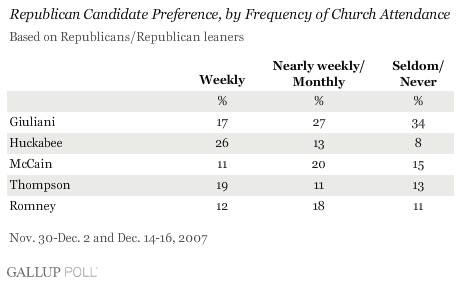
The Age Factor
The leading Republican presidential candidates this year are relatively old. Four of the five candidates whose support levels are analyzed in this review are 60 years of age or older: McCain, who is currently 71 years of age; Giuliani, who is 63; Thompson, who is 65; and Romney, who is 60. That leaves the youthful Huckabee -- now 52 years of age -- as the lone sub-60-year-old candidate among this group.
The age of the candidate does not appear to be related to differences in his support by age, however.
Huckabee's support is higher among Republicans 50 years and up than it is among those under 50. At the same time, the strongest disproportionate support among younger Republicans is for the 63-year-old Giuliani, whose support level is 10 points higher among those under 50 than among those over 50.
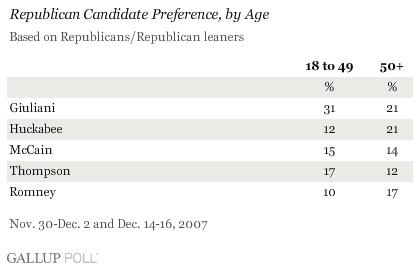
Region
Not surprisingly, presidential candidates generally tend to do better among voters in the regions of the country from which they come than they do elsewhere.
Huckabee -- from Arkansas -- does best in the South and the Midwest. Thompson, from Tennessee, does best in the South.
But front-runner Giuliani, who is from New York, has a fairly consistent appeal across regions, except for a somewhat lower level of support in the South.
Romney also has a fairly even distribution of support across regions, except for a slightly lower level of support in the South, which is the one region to which he does not have any direct ties (Romney attended Brigham Young University in Utah and is famous for his work on the 2002 Salt Lake City Winter Olympics; his father was governor of Michigan in the Midwest; and Romney has more recently resided in and served as governor of Massachusetts).
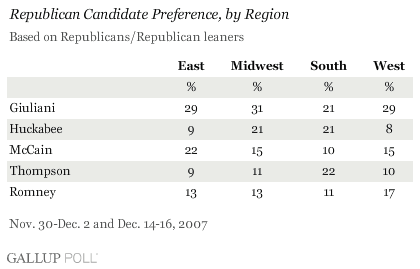
Education
There are not major differences in candidate support by education. The support for most of the candidates is generally fairly consistent across educational categories. Republicans with college degrees tend to be more likely than those with less education to say they support Romney.
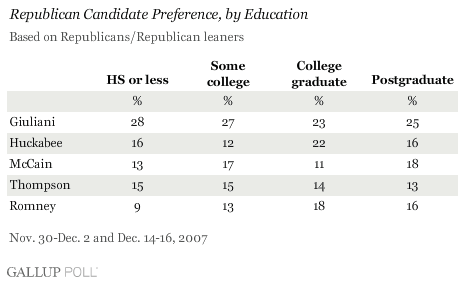
Survey Methods
Results are based on two nationally representative USA Today/Gallup and Gallup Poll surveys conducted between Nov. 30-Dec. 2, 2007, and Dec. 14-16, 2007. The combined database includes 824 Republicans and independents who lean Republican.
For results based on the total sample of Republican and Republican leaners, one can say with 95% confidence that the maximum margin of sampling error is ±4 percentage points. In addition to sampling error, question wording and practical difficulties in conducting surveys can introduce error or bias into the findings of public opinion polls.
